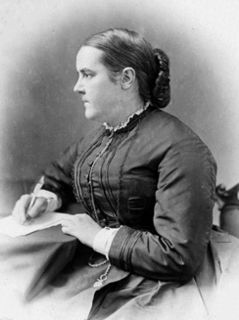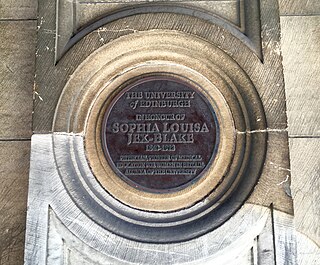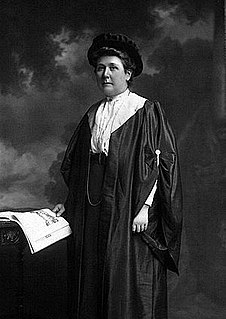Jex-Blake is a surname. Notable people with the surname include:
Blake is a surname or a given name which originated from Old English. Its derivation is uncertain; it could come from "blac", a nickname for someone who had dark hair or skin, or from "blaac", a nickname for someone with pale hair or skin. Another theory, presumably in the belief it is a Welsh patronymic in origin, for which there is no evidence whatsoever, was that it is a corruption of "Ap Lake", meaning "Son of Lake".

Sophia Louisa Jex-Blake was an English physician, teacher and feminist. She led the campaign to secure women access to a University education when she and six other women, collectively known as the Edinburgh Seven, began studying medicine at the University of Edinburgh in 1869. She was the first practising female doctor in Scotland, and one of the first in the wider United Kingdom of Great Britain and Ireland; a leading campaigner for medical education for women and was involved in founding two medical schools for women, in London and Edinburgh at a time when no other medical schools were training women.
Bowlby is a surname. Notable people with the surname include:

Sir Robert Christison, 1st Baronet, FRSE FRCSE FRCPE, was a Scottish toxicologist and physician who served as president of the Royal College of Physicians of Edinburgh and as president of the British Medical Association (1875). He was the first person to describe renal anaemia.

The Edinburgh Seven were the first group of matriculated undergraduate female students at any British university. They began studying medicine at the University of Edinburgh in 1869 and, although the court of Session ruled they should never have been admitted, and they did not graduate or qualify as doctors, the campaign they fought gained national attention and won them many supporters, including Charles Darwin. Their campaign put the demands of women for a university education on the national political agenda, which eventually resulted in legislation to ensure that women could study medicine at university in 1876.
The London School of Medicine for Women established in 1874 was the first medical school in Britain to train women as doctors. The patrons, vice-presidents, and members of the committee that supported and helped found the London School of Medicine for Women wanted to provide educated women with the necessary facilities for learning and practicing midwifery and other branches of medicine while also promoting their future employment in the fields of midwifery and other fields of treatment for women and children.

The Edinburgh School of Medicine for Women was founded by Sophia Jex-Blake in Edinburgh, Scotland, in October of 1886, with support from the National Association for Promoting the Medical Education of Women. Sophia Jex-Blake was appointed as both the Director and the Dean of the School. The first class of women to study at the Edinburgh School of Medicine for Women consisted of eight students, the youngest of whom was nineteen years of age. Throughout its twelve years in operation, the school struggled to find financial funding to keep its doors open. A rival institution, the Edinburgh College of Medicine for Women, set up by Elsie Inglis with the help of her father John Inglis, attracted several students of Jex-Blake, including Martha Cadell and Grace Cadell. St Mungo's College and Queen Margaret College in Glasgow also accepted women medical students and when the Scottish universities began to do so the Edinburgh School of Medicine could no longer compete. The school folded and closed its doors in 1898. Over the twelve years of its operation, the Edinburgh School of Medicine provided education to approximately eighty female students. Of those eighty students, thirty-three completed the full course of medical training at the Edinburgh School while many others chose to finish their education at outside institutions.
Buxbaum is a German surname meaning box tree. Notable people with the surname include:
Ahearn or Ahearne is a surname. Notable people with the surname include:
Bewley is a surname of English origin. It may derive from the French name Beaulieu.
Peiris, Peries or Pieris is a Sinhalese surname. It is a common surname in coastal area of Sri Lanka. It is originated from Portuguese surname Peres and was spread across Sri Lanka during the time of Portuguese rule of the island. The name has been adapted into the Sinhalese language over time, hence the variation in its spelling. Notable people with the surname include:
Buttar is a surname. Notable people with the surname include:
Blakely is an English and Scottish surname. Notable people with the surname include:

Grace Ross Cadell was in the first group of women to study medicine in Scotland and qualify. She was, with Elsie Inglis, one of the initial entrants to the Edinburgh School of Medicine for Women, set up by Sophia Jex-Blake in 1886. Her determination and character were demonstrated by her standing up to Jex-Blake over a disciplinary matter, being dismissed from the school and subsequently successfully suing Jex-Blake and her school. Her career as a Scottish pioneer physician, surgeon was devoted mainly to the care of women and children. She became an active suffragette as was well known for public acts of defiance in the cause of women's suffrage. She was prominent in providing medical care and refuge for her fellow suffragettes, some of whom were released into her care directly from episodes of force feeding in prison. Her home became well known as a sanctuary for suffragettes.
Torney is an English, Northern-Irish and German surname which is most prevalent in Australia and has its highest density in the North of Ireland.
Strangeways is a surname. Notable people with the surname include:

The Edinburgh College of Medicine for Women was established by Elsie Inglis and her father John Inglis. Elsie Inglis went on to become a leader in the suffrage movement and found the Scottish Women's Hospital organisation in World War I, but when she jointly founded the College she was still a medical student. Her father, John Inglis, had been a senior civil servant in India, where he had championed the cause of education for women. On his return to Edinburgh he became a supporter of medical education for women and used his influence to help establish the college. The college was founded in 1889 at a time when women were not admitted to university medical schools in the UK.
Jex is a surname. Notable people with the surname include:
Arthur John Jex-Blake was a British physician, specializing in heart and lung diseases.
Jenner is a surname.